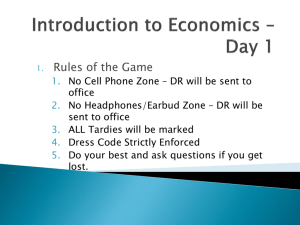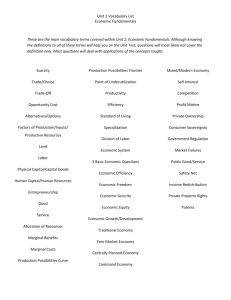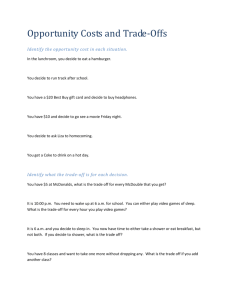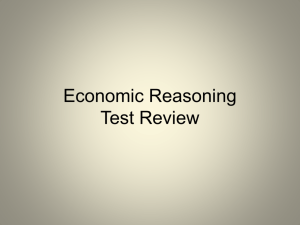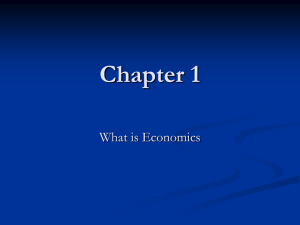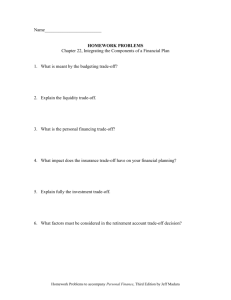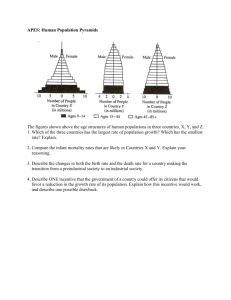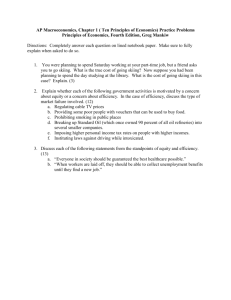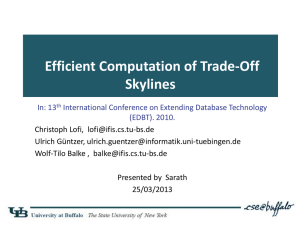Quick Quizzes Tradeoffs are the various alternative uses of our time
advertisement
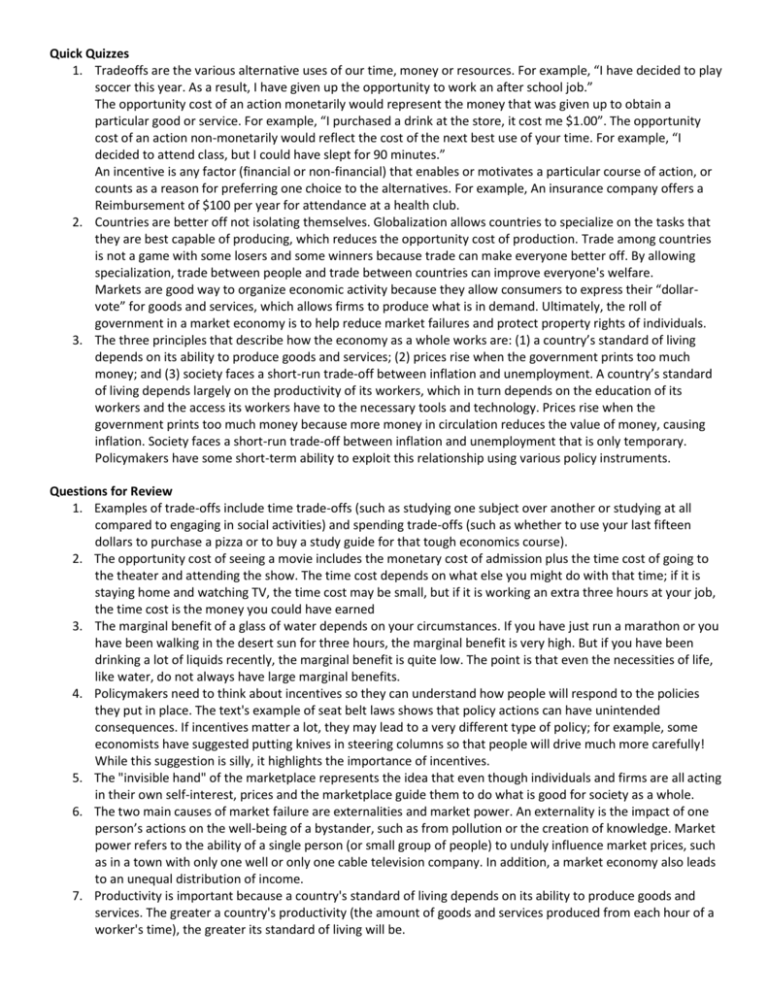
Quick Quizzes 1. Tradeoffs are the various alternative uses of our time, money or resources. For example, “I have decided to play soccer this year. As a result, I have given up the opportunity to work an after school job.” The opportunity cost of an action monetarily would represent the money that was given up to obtain a particular good or service. For example, “I purchased a drink at the store, it cost me $1.00”. The opportunity cost of an action non-monetarily would reflect the cost of the next best use of your time. For example, “I decided to attend class, but I could have slept for 90 minutes.” An incentive is any factor (financial or non-financial) that enables or motivates a particular course of action, or counts as a reason for preferring one choice to the alternatives. For example, An insurance company offers a Reimbursement of $100 per year for attendance at a health club. 2. Countries are better off not isolating themselves. Globalization allows countries to specialize on the tasks that they are best capable of producing, which reduces the opportunity cost of production. Trade among countries is not a game with some losers and some winners because trade can make everyone better off. By allowing specialization, trade between people and trade between countries can improve everyone's welfare. Markets are good way to organize economic activity because they allow consumers to express their “dollarvote” for goods and services, which allows firms to produce what is in demand. Ultimately, the roll of government in a market economy is to help reduce market failures and protect property rights of individuals. 3. The three principles that describe how the economy as a whole works are: (1) a country’s standard of living depends on its ability to produce goods and services; (2) prices rise when the government prints too much money; and (3) society faces a short-run trade-off between inflation and unemployment. A country’s standard of living depends largely on the productivity of its workers, which in turn depends on the education of its workers and the access its workers have to the necessary tools and technology. Prices rise when the government prints too much money because more money in circulation reduces the value of money, causing inflation. Society faces a short-run trade-off between inflation and unemployment that is only temporary. Policymakers have some short-term ability to exploit this relationship using various policy instruments. Questions for Review 1. Examples of trade-offs include time trade-offs (such as studying one subject over another or studying at all compared to engaging in social activities) and spending trade-offs (such as whether to use your last fifteen dollars to purchase a pizza or to buy a study guide for that tough economics course). 2. The opportunity cost of seeing a movie includes the monetary cost of admission plus the time cost of going to the theater and attending the show. The time cost depends on what else you might do with that time; if it is staying home and watching TV, the time cost may be small, but if it is working an extra three hours at your job, the time cost is the money you could have earned 3. The marginal benefit of a glass of water depends on your circumstances. If you have just run a marathon or you have been walking in the desert sun for three hours, the marginal benefit is very high. But if you have been drinking a lot of liquids recently, the marginal benefit is quite low. The point is that even the necessities of life, like water, do not always have large marginal benefits. 4. Policymakers need to think about incentives so they can understand how people will respond to the policies they put in place. The text's example of seat belt laws shows that policy actions can have unintended consequences. If incentives matter a lot, they may lead to a very different type of policy; for example, some economists have suggested putting knives in steering columns so that people will drive much more carefully! While this suggestion is silly, it highlights the importance of incentives. 5. The "invisible hand" of the marketplace represents the idea that even though individuals and firms are all acting in their own self-interest, prices and the marketplace guide them to do what is good for society as a whole. 6. The two main causes of market failure are externalities and market power. An externality is the impact of one person’s actions on the well-being of a bystander, such as from pollution or the creation of knowledge. Market power refers to the ability of a single person (or small group of people) to unduly influence market prices, such as in a town with only one well or only one cable television company. In addition, a market economy also leads to an unequal distribution of income. 7. Productivity is important because a country's standard of living depends on its ability to produce goods and services. The greater a country's productivity (the amount of goods and services produced from each hour of a worker's time), the greater its standard of living will be. Problems and Applications 1. a. A family deciding whether to buy a new car faces a trade-off between the cost of the car and other things they might want to buy. For example, buying the car might mean they must give up going on vacation for the next two years. So the real cost of the car is the family's opportunity cost in terms of what they must give up. b. For a member of Congress deciding whether to increase spending on national parks, the trade-off is between parks and other spending items or tax cuts. If more money goes into the park system, that may mean less spending on national defense or on the police force. Or, instead of spending more money on the park system, taxes could be reduced. c. When a company president decides whether to open a new factory, the decision is based on whether the new factory will increase the firm's profits compared to other alternatives. For example, the company could upgrade existing equipment or expand existing factories. The bottom line is: Which method of expanding production will increase profit the most? d. In deciding how much to prepare for class, a professor faces a trade-off between the value of improving the quality of the lecture compared to other things she could do with her time, such as working on additional research. e. In deciding whether to go to graduate school, the student faces a trade-off between her possible earnings with a bachelor’s degree and the benefits of an increased education (such as higher future earnings and greater knowledge). 2. 3. 4. 5. 6. If you are thinking of going skiing instead of working at your part-time job, the cost of skiing includes its monetary and time costs, which includes the opportunity cost of the wages you are giving up by not working. If the choice is between skiing and going to the library to study, then the cost of skiing is its monetary and time costs including the cost of getting lower grades in your courses. If you spend $100 now instead of saving it for a year and earning 5 percent interest, you are giving up the opportunity to spend $105 a year from now. Harry suggests looking at whether productivity would rise or fall. Productivity is certainly important, since the more productive workers are, the lower the cost per gallon of potion. Ron wants to look at average cost. But both Harry and Ron are missing the other side of the equation_revenue. A firm wants to maximize its profits, so it needs to examine both costs and revenues. Thus, Hermione is right_it is best to examine whether the extra revenue would exceed the extra costs. Hermione is the only one who is thinking at the margin. a. The provision of Social Security benefits lowers an individual’s incentive to save for retirement. The benefits provide some level of income to the individual when he or she retires. This means that the individual is not entirely dependent on savings to support consumption through the years in retirement. b. Since a person gets fewer after-tax Social Security benefits the greater his or her earnings are, there is an incentive not to work (or not work as much) after age sixty-five. The more you work, the lower your after-tax Social Security benefits will be. Thus, the taxation of Social Security benefits discourages work effort after age sixty-five. a. When welfare recipients have their benefits cut off after two years, they have a greater incentive to find jobs than if their benefits were to last forever. b. The loss of benefits means that someone who cannot find a job will get no income at all, so the distribution of income will become less equal. But the economy will be more efficient, because welfare recipients have a greater incentive to find jobs. Thus, the change in the law is one that increases efficiency but reduces equality.
